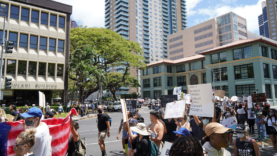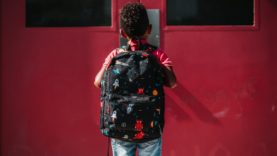Inside DACA: undocumented living
The Supreme Court has pushed the abolishment of DACA away, and the experts predict the program should be safe until after the elections. The misconceptions about DACA and what it means to be a DACA recipient continue circulating, so we spoke to Venus Pinzon and Stephanie Sevilla, both current DACA recipients from different backgrounds, about their own experiences with the program.
With the safety of DACA being temporarily secure from the Trump administration, DACA recipient Venus Pinzon breathes a sigh of relief.
Pinzon has lived in the United States ever since she was six years old. She married her high school sweetheart and has a child that reminds her so much of herself. She works as an assistant manager in a tourist shop on Pier 39. Since COVID-19, Pinzon has been taking care of her mother and son.
Much like Pinzon, Stephanie Sevilla is also a DACA recipient. She didn’t even know she was undocumented until she was about 10 years old.
“I started to notice that there were aspects that we couldn’t do. That they would fear a knock on the door…”
Sevilla just got accepted into law school.
“I want to become a lawyer to help others in similar situations like I was,” she shared.
Both Pinzon and Sevilla applied for the program the moment it was introduced in 2012.
Misconceptions
“Everybody thinks we are going to sponsor our family, our grandma, our aunts, our uncles, etc,” states Pinzon.
DACA gives undocumented children who were brought to the country at a young age the ability to have a semi-normal life. The program does not give them a set path to citizenship, or the ability to be a sponsor.
Another misconception is that DACA is easily attainable to immigrants. However, only those who were physically present in the country before June 15, 2012 were qualified. There’s also a wide range of other guidelines, including continuous US residence since June 15, 2007, and the absence of any legal status at the time of application.
“If you came a day after the set date, even if you were a minor, you could not qualify,” states Sevilla.
No money, no service, no DACA
“The prices have been going up,” says Sevilla.
Since the start of the program, she’s re-applied for it three times. Because she lives in Hawaii and has to travel to the main island, Oahu, the last time she filed she paid a total of $2,000. This includes her travel expenses, lawyer fees, and the application fee itself.
The USCIS fee is $495 and is due every two years, since the application has to be renewed in order for the DACA status to remain valid. On average, applicants spend $800-$2,000 for each filing. The fees are non-refundable if the application is denied.

What it really means to be a DACA recipient?
For Sevilla, it means to be “a part of the country while at the same time not a part of it.”
“They’re all over, they’re working in farms, factories, the medical field, etc. They make the United States better because to them it’s their home. They grew up here, many of them don’t know anything about their country of origin. They’ve devoted their whole life to a country that they hope will accept them,” says Sevilla.
For Pinzon, it’s a secret she has to keep to herself. Especially when in the area that she knows will not be so welcoming to the idea.
“When I go visit family, I’m more careful about how we portray as Hispanics,” says a worried Pinzon.
The question of whether the program will continue after the elections is still up in the air and 700,000 of DACA recipients’ lives will be on the line.
What’s at stake?
Sevilla was three years old when she was brought to the Untied States. If she were sent back, she would be giving up her dream of becoming a lawyer.
“I want to become a lawyer to help others in similar situations like I was,” states Sevilla.
If Pinzon were to be deported, she would leave her husband and possibly her mother. This is a fear she’s had for quite some time now.
“If I was deported, my son would go with me back to Mexico. Which would suck because all his family is here,” stated Pinzon.
Do you have your own experience you’d like to share or have any questions to ask? Sign up for a free account and post directly to our LiveFEED!




























